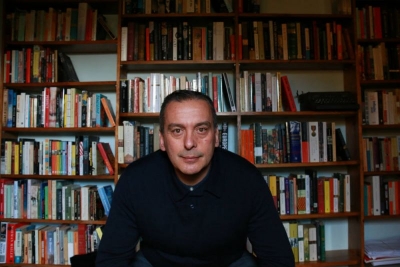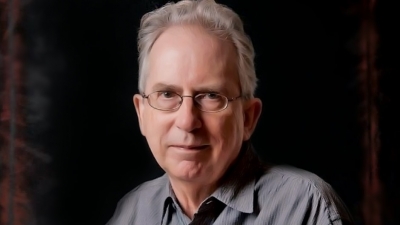Interviews
Ramona Koval asked Robert Manne what his version of the strange story of Helen Demidenko might be.
Robert Manne: Well there was once, I think, a very strange young Australian woman of English parents, who, for reasons that we don’t understand decided to identify with Ukrainian war criminals. She decided that the Jews had got control of the history of the Holocaust and that a terrible story of what happened to Ukrainians at the hands of Jews had not been told. So she decided to take the name Demidenko because she read in a book that Demidenko was a Ukrainian who had been at Babi Yar where thirty-three thousand Jews were killed. She identified so strongly that she took the name Demidenko and wrote a high school essay in which she imagined what it would be like to be Ivan the Terrible, probably the most monstrous figure that emerges from the killings at Treblinka or at any other extermination camp. She decided to write a novel in which she would adopt the identity, imagining herself to be this daughter of a Ukrainian war criminal, with an uncle who served at Treblinka. And so she wrote a novel. Amazingly enough, not only was her novel published but it won a major award. It so convinced the literary community of its authenticity that it was regarded in 1995 as the best literary work published in the country.
... (read more)Ramona Koval: I would like to begin by talking about the differences between writing fiction and non-fiction. You write about birth and youth, sex, illness, death, sisters ... the big things in life. How does that differ for writing fiction and non-fiction, if at all?
Helen Garner: I find that the subjects for non-fiction that I write about seem to present themselves from outside myself, whereas the fictional ones are much more some little thing that’s been worming away at me that I’ve become conscious of. The fiction kind of worms its way out and the non-fiction worms its way in, I suppose you could say it that way.
... (read more)Garry Disher: The Sunken Road is a so-called literary novel. I find that I’m a bit typecast, Garry Disher the crime writer or Garry Disher the children’s writer. A lot of the fiction I’ve written is so-called more literary in nature. This is my big book, up to date, if you like. It’s a novel set in the wheat and wool country in the mid-north of South Australia where I grew up. It’s a story of the region and of a family and of a main character called Anna Tolley. I tell this story in a series of biographical fragments around a theme like Christmas, or love, or hate, or birthdays. And each fragment takes a character from childhood to old age. And I repeat this pattern right through the book and certain secrets are revealed or come to the surface through this repetition. So at that level I suppose it’s a linear story, but the structure’s not all that linear. In terms of structure it’s an advance for me, or an experiment.
... (read more)Christos Tsiolkas, author of Loaded, is a 29-year-old gay, Greek-Australian who lives in Melbourne. His essays, journalism, and reviews have appeared in the gay press, ethnic press, student, and left-wing journals.
... (read more)Helen Daniel: I find The Sitters very different from The Ancestor Game, which seems to me much more elaborate and complex. This new novel, which is about absence and silence, is an occasion of great economy and restraint.
Alex Miller: I think a couple of times in the book I actually say the story is my secret. In other words, I’m not going to tell you the story, I’m going to leave that out. Having left the story out, this is what’s left, which is always a kind of aim with me, and I think with any writer probably, to try to do as much as possible with as little. To leave it all out.
... (read more)The first draft didn’t have Tristan, this deformed little character. Then I was reading to the kids, Beauty and the Beast. It was very beautifully written, terribly moving – and they were moved. I read it to them many times, thinking it would be interesting to look at that. Then, round about this time, I was walking along the street and glimpsed a terribly deformed young man in a wheelchair. I couldn’t bear to look at him yet I carried with me afterwards a vision, this bright, bright intelligence and this weird twisted-up face. It was quite moving and, having flinched from it, as from a fire or being cut, I began to make myself think about what was in there. That really goes back again to the very beginning of my work, the short stories. In the very beginning I was affected by Faulkner and As I Lay Dying because Faulkner was giving rich, interior worlds to people who you might otherwise pass by. That’s been a continual thing in my work, perhaps.
... (read more)In his latest novel, Moments of Pleasure, Julian Davies continues his exploration of father and son relationships, and of the role of desire in women’s lives. He talks here about his interest in contemporary manners, beginning by answering the question, why so much talk and so little pleasure?
... (read more)It has a relevance in one sense because it is a worry, since we live in a world which seems to have taxological problems. People like to be able to put things in one category or another. I seem at the moment to be writing in a way that sits on the line.
... (read more)Anyone who has had the experience of trying to translate a poem across even a fairly low-density language barrier (say German or French into English) will have tasted the near despair of finding oneself in danger of killing that in the creature that one most wanted to save. Sometimes it feels like cutting down the tree and whittling from the wood a mere mock replica of it – the sap goes, the leaves in all their lively beauty disappear, and at best there’s an artifact which cleverly reproduces the mere outlines of what was once brimming with life.
... (read more)I’ve left formal art criticism behind to a certain extent and I’m glad to do that.’ I found the area of art criticism very inhibiting and when I was waiting the book on Joy Hester in tandem with my first novel, crossing the t’s and dotting the I’s, and getting everything absolutely correct, suddenly seemed enormously constraining. But writing about Joy Hester, who is difficult (because so many of her works deal with states of feeling), I think I helped push my writing further and further away from the correctness of art history and towards a much more lyrical and imaginative way of writing.
... (read more)



